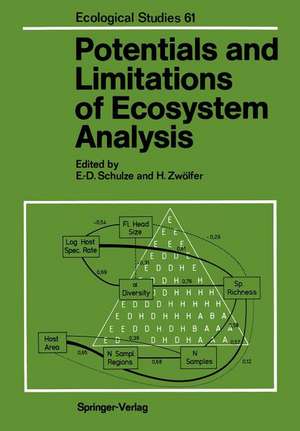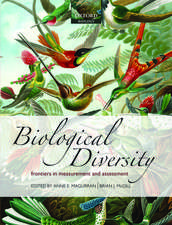Potentials and Limitations of Ecosystem Analysis: Ecological Studies, cartea 61
Editat de Ernst-Detlef Schulze, Helmut Zwölferen Limba Engleză Paperback – 20 noi 2011
Din seria Ecological Studies
- 18%
 Preț: 1118.93 lei
Preț: 1118.93 lei -
 Preț: 553.71 lei
Preț: 553.71 lei - 18%
 Preț: 1680.55 lei
Preț: 1680.55 lei - 18%
 Preț: 1003.38 lei
Preț: 1003.38 lei - 20%
 Preț: 1004.69 lei
Preț: 1004.69 lei -
 Preț: 480.62 lei
Preț: 480.62 lei - 5%
 Preț: 752.26 lei
Preț: 752.26 lei - 15%
 Preț: 643.99 lei
Preț: 643.99 lei - 15%
 Preț: 644.18 lei
Preț: 644.18 lei - 15%
 Preț: 652.49 lei
Preț: 652.49 lei - 18%
 Preț: 789.83 lei
Preț: 789.83 lei -
 Preț: 382.36 lei
Preț: 382.36 lei - 15%
 Preț: 643.48 lei
Preț: 643.48 lei - 15%
 Preț: 646.30 lei
Preț: 646.30 lei - 15%
 Preț: 634.32 lei
Preț: 634.32 lei -
 Preț: 384.86 lei
Preț: 384.86 lei - 18%
 Preț: 789.98 lei
Preț: 789.98 lei - 15%
 Preț: 645.14 lei
Preț: 645.14 lei - 15%
 Preț: 649.39 lei
Preț: 649.39 lei - 18%
 Preț: 1005.43 lei
Preț: 1005.43 lei - 18%
 Preț: 949.23 lei
Preț: 949.23 lei - 15%
 Preț: 649.54 lei
Preț: 649.54 lei - 15%
 Preț: 643.34 lei
Preț: 643.34 lei - 15%
 Preț: 649.71 lei
Preț: 649.71 lei - 15%
 Preț: 638.76 lei
Preț: 638.76 lei - 18%
 Preț: 957.62 lei
Preț: 957.62 lei - 18%
 Preț: 1235.25 lei
Preț: 1235.25 lei - 18%
 Preț: 962.18 lei
Preț: 962.18 lei - 18%
 Preț: 949.23 lei
Preț: 949.23 lei - 15%
 Preț: 660.68 lei
Preț: 660.68 lei -
 Preț: 397.76 lei
Preț: 397.76 lei - 15%
 Preț: 638.24 lei
Preț: 638.24 lei - 18%
 Preț: 942.31 lei
Preț: 942.31 lei - 18%
 Preț: 1232.57 lei
Preț: 1232.57 lei - 15%
 Preț: 651.34 lei
Preț: 651.34 lei - 18%
 Preț: 952.72 lei
Preț: 952.72 lei - 18%
 Preț: 1834.27 lei
Preț: 1834.27 lei - 18%
 Preț: 1229.10 lei
Preț: 1229.10 lei -
 Preț: 423.95 lei
Preț: 423.95 lei - 18%
 Preț: 948.92 lei
Preț: 948.92 lei
Preț: 651.19 lei
Preț vechi: 766.10 lei
-15% Nou
Puncte Express: 977
Preț estimativ în valută:
124.61€ • 130.43$ • 103.71£
124.61€ • 130.43$ • 103.71£
Carte tipărită la comandă
Livrare economică 01-15 aprilie
Preluare comenzi: 021 569.72.76
Specificații
ISBN-13: 9783642716324
ISBN-10: 3642716326
Pagini: 452
Ilustrații: XII, 436 p.
Dimensiuni: 170 x 244 x 24 mm
Greutate: 0.72 kg
Ediția:Softcover reprint of the original 1st ed. 1987
Editura: Springer Berlin, Heidelberg
Colecția Springer
Seria Ecological Studies
Locul publicării:Berlin, Heidelberg, Germany
ISBN-10: 3642716326
Pagini: 452
Ilustrații: XII, 436 p.
Dimensiuni: 170 x 244 x 24 mm
Greutate: 0.72 kg
Ediția:Softcover reprint of the original 1st ed. 1987
Editura: Springer Berlin, Heidelberg
Colecția Springer
Seria Ecological Studies
Locul publicării:Berlin, Heidelberg, Germany
Public țintă
ResearchCuprins
to the Problem of Ecosystem Analysis.- to the Problem of Ecosystem Analysis.- 1 Input/Output Analysis of Ecosystems.- Preface.- A. Stability, Elasticity, and Resilience of Terrestrial Ecosystems with Respect to Matter Balance.- B. Water and Carbon Fluxes in Ecosystems.- C. Environmental Transfer of Some Organic Micropollutants.- D. Simple and Diversified Crop Rotations — Approach and Insight into Agroecosystems.- 2 Processes and Functions at the Primary Producer Level.- Preface.- A. Plant Specialization to Environments of Different Resource Availability.- B. Control of Leaf Carbon Assimilation — Input of Chemical Energy into Ecosystems.- C. Plant Architecture and Resource Competition.- D. Responses to Water and Nutrients in Coniferous Ecosystems.- E. Physiological Ecology, Disturbance, and Ecosystem Recovery.- F. A Hierarchic Approach in Causal Ecosystem Analysis. The Calcifuge-Calcicole Problem in Alpine Grasslands.- G. Extinction and Naturalization of Plant Species as Related to Ecosystem Structure and Function.- H. Flowers as Food Sources and the Cost of Outcrossing.- 3 Processes and Functions at the Consumer Level.- Preface.- A. Species Richness, Species Packing, and Evolution in Insect-Plant Systems.- B. Niche Structure and Evolution in Ecosystems.- C. Predictability in Lake Ecosystems: the Role of Biotic Interactions.- D. Saline Lake Ecosystems.- E. Characteristics of Lotic Ecosystems and Consequences for Future Research Directions.- F. Experimental Analysis of Processes Between Species on Marine Tidal Flats.- G. On Methods of Analyzing Ecosystems: Lessons from the Analysis of Forest-Insect Systems.- Synthesis (With 1 Figure).- Spezies Index.














